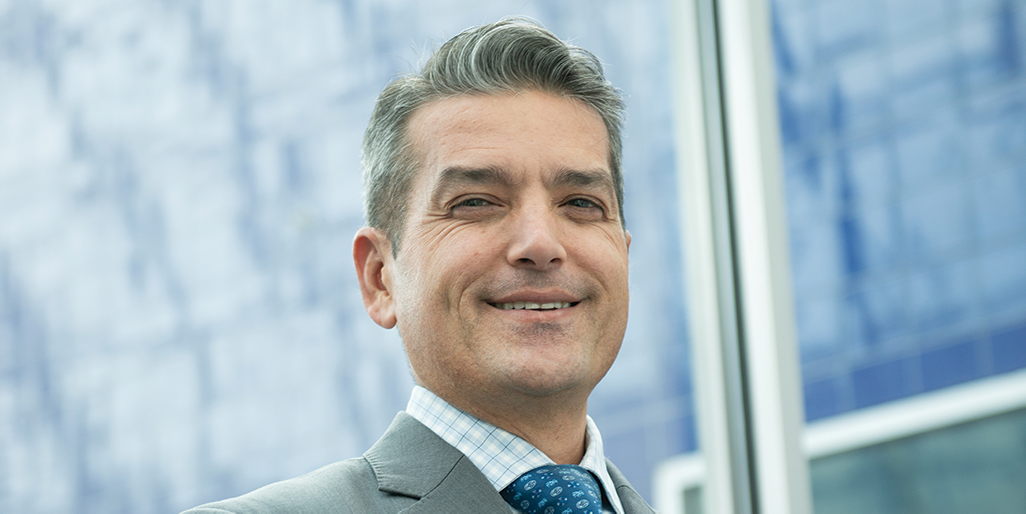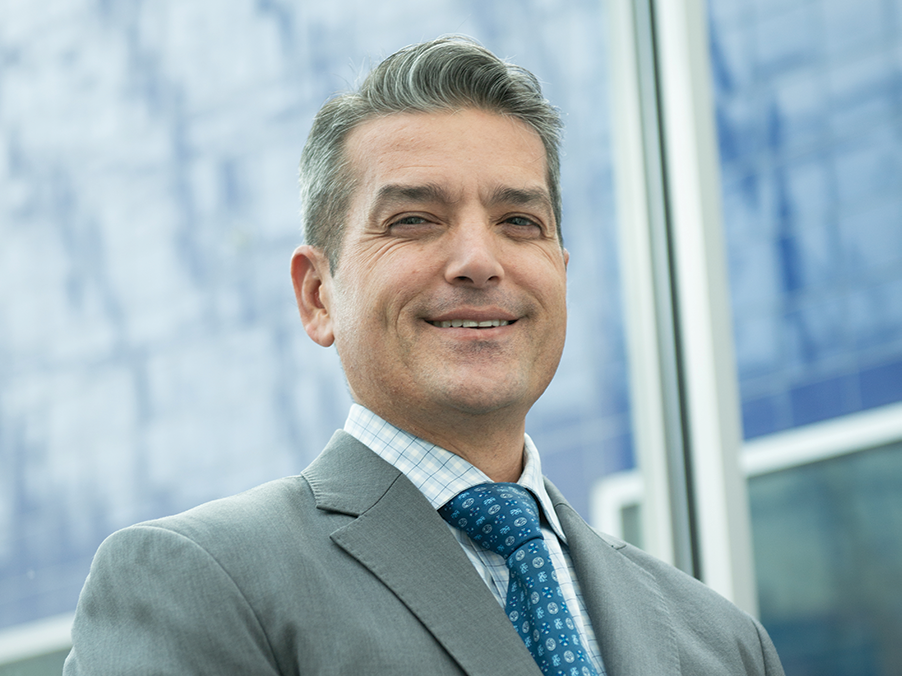
Big Data Gets Schooled

Big Data Gets Schooled
Originally Posted 1/14/2019 |
FROM THE WINTER/SPRING 2019 ISSUE
His eyes light up like a child who has just seen fireworks fill the night sky for the first time. Yet it is not brilliance and sparkle that have captured the attention of Mike Villarreal, founding director of UTSA’s Institute of Urban Education. It’s facts, figures, charts, and graphs. Villarreal sees UTSA as a prosperity engine in one of the fastest growing cities in the United States and the institute’s education research as a way of amplifying UTSA’s community impact.
The new institute is a cornerstone in UTSA’s urban-serving mission. When President Taylor Eighmy arrived at UTSA he envisioned an institute on the Downtown Campus structured much like the University of Chicago’s Urban Education Institute, which has been a driver behind improved public education outcomes in Chicago.
“The important work that Mike is doing to lay the foundation for our new Urban Education Institute is vital to creating an enterprise focused on innovative partnerships and new approaches to education,” Eighmy says. “UTSA will be at the forefront of preparing teachers for the classrooms of today and tomorrow.”
“When I first heard of President Eighmy's vision, I told myself I needed to move my research from UT Austin to UTSA and help my own community.”
Specifically, it is an education-research-practice partnership created by the College of Education and Human Development. “This was a collaborative process among key faculty and leadership in COEHD and with President Eighmy’s vision and support. And with a generous grant from the Raise Your Hand Texas Foundation, we were able to make the concept a reality,” says Margo DelliCarpini, COEHD’s dean. “Dr. Villarreal will lead the institute as we engage in a number of projects that address the ‘big questions’ in education and provide answers that turn grand challenges into grand opportunities.”
DelliCarpini describes the Urban Education Institute as a space where transdisciplinary research teams, school districts, and community organizations can come together and collaboratively work to enhance educational outcomes. “The institute will serve as a demonstration site for best practices,” she says, “with longer term goals of attracting research fellows from around the world to create knowledge that impacts policies and practice in urban and other educational settings. The work that emerges will address issues of equity and access across the P-20 educational spectrum.”
Since joining UTSA, Villarreal has laid the foundation with initial partnerships and collaborative projects. The Raise Your Hand Texas Foundation provided the seed funding for the new institute, and Villarreal’s goal is to match its contribution from other sources. The institute is also partnering with the Greater Texas Foundation, the San Antonio Area Foundation, the Baptist Health Foundation of San Antonio, the City of San Antonio, and Goodwill Industries of San Antonio.
As a first-generation college student, a researcher, and a former state representative, Villarreal says he is excited to reveal the powerful lessons that data science can teach local stakeholders to improve education on all levels for students and educators. “The institute is primarily focused on leveraging big data to analyze the impact community efforts are making to improve student outcomes,” Villarreal says. One of the first studies he’s produced, for example, is a look at the impact of San Antonio’s Pre-K 4 SA program, a high-priority project, since voters will be asked to renew the sales tax for public education for 4-year-old residents in the near future.
“San Antonio was one of the first cities to fund a pre-K program,” he says, “and it has become a national model of success. The first pre-K students were third graders in the fall of 2017, so we have completed a study of their reading and math scores and determined the impact high-quality early education made on their development when compared to similar students who enrolled in the typical public prekindergarten program.”
“This is how the institute begins to play a role in education policy for the city,” he adds. “Through the institute we will help education professionals from pre-K to adult job training have a more powerful impact on the students they serve.” By starting at the beginning with pre-K children, this institute will further strengthen UTSA as a prosperity driver for a thriving, dynamic San Antonio.
Villarreal has also formed a data partnership with the San Antonio Education Partnership, a public-private program that’s operated in San Antonio for 30 years. SAEP provides up to $2 million a year in scholarship funds for higher education. “But,” Villarreal points out, “they have never had the data to evaluate the impact of their investment in students.”
The institute has tracked those students for eight years—beyond high school—and compared their college-enrollment and degree-completion rates relative to similar students from the same high school graduating classes and with the same high school academic records. The study helped SAEP learn how much a difference its scholarship program is making.
Villarreal found that the SAEP scholarship increased a student’s probability of earning a postsecondary degree within six years of college by nine percentage points. Relative to the comparison group that did not receive the scholarship, SAEP grew the number of college graduates among awardees by 23%—nearly a quarter earned a college degree because of SAEP. Many of those recipients have attended UTSA. “We are able to help our partners understand who benefits the most from their assistance,” Villarreal says. “They can see exactly who made the most of their investment and how it ultimately changes lives.”
The institute is also actively assisting local school districts. “We are assisting San Antonio Independent School District to collect data for teacher development,” Villarreal says. “Our quantitative data analysis will complement the district’s qualitative classroom observation data to better identify teachers in need of professional development and support.”
Villarreal is also working with 12 local high schools to help them vertically align their dual-credit classes with UTSA and the Alamo Colleges District to improve student success rates.
In partnership with the P16Plus Council of Greater Bexar County and the Education Service Center of Region 20, high school faculty and their peers at UTSA and the Alamo Colleges are having crucial conversations about what makes a rigourous college-level course. The institute’s role in this process is to provide data analysis support. By the end of the project faculty will develop a shared agreement on curriculum and assessments for dual-credit classes in English and mathematics.
A second part of this project involves developing practical tools to raise educational attainment. Working with UTSA students and a team of area high school students, the institute, P16Plus, and ESC will be facilitating a user-designed process to produce a graphic comic book that informs middle school students about dual credit and other ways to prepare for college. Villarreal considers this project the institute’s most innovative project. It builds on a growing body of research that finds sequential visual art—what we often call comic books—is a powerful medium for engaging readers of all ages in complicated ideas and story lines. Their book will direct students to an online companion toolkit featuring a high school course calculator to help students learn about how their high school courses relate to their probability of college degree completion.
As 2019 begins, Villarreal will direct the institute to look for a variety of answers to improve the numbers of local students who actually enroll in college. “In San Antonio eight out of 10 students say they want a college degree in their freshmen year of high school,” he explains, “but only four out of 10 actually enroll. We must ask ourselves why and seek out the local and state policy levers that can change this.”
As part of that journey of understanding, Villarreal will initiate ways to connect UTSA with the community. “UTSA is blessed with brilliant scientists and students across our university,” he says. “We need to be playing matchmaker between our local education stakeholders and our talented faculty.” The institute will create opportunities for UTSA faculty and students at all levels by making these connections and providing financial support to address San Antonio’s most pressing education challenges.
“When I first heard of President Eighmy’s vision, I told myself I needed to move my research from UT Austin to UTSA and help my own community—the place I was raised and where I am raising my two children,” he says.
Today, Villarreal is one busy man. There is fundraising to do, there are presentations to be made, and there are partnerships to be developed. But his eyes light up with expectation as each evidence-based conclusion is reached.

